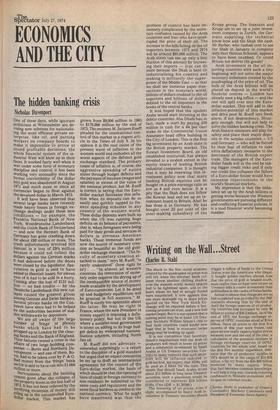Writing on the Wall...Street
Charles R. Stahl
The shock to the free world economy created by the quadrupled oil prices was still felt when the Herstatt Bank collapse threw another chilling shadow over the western world; money spigots had to be tightened again, and so the bears whom we had so smugly buried were resurrected. It now appears that one more downside leg in share prices quoted on the New York Stock Exchange will be required before a bottoming process can start, and a new bull market begin. But it is our opinion that a turning point may be at hand: US Treasury Secretary William Simon's visit to four Arab countries could kindle new hope that at least in economic terms things may be looking up again. It is our contention that Secretary Simon's negotiations with the Arab oil producers will result in lower oil prices and a substantial investment by Saudi Arabia in US Treasury securities. Contrary to many rumours that such securit i e's will be inflation-indexed or gold-backed, we expect that SDRs will be used as a basis for the loan. This means that should Saudi Arabia invest about $12 billion in long term Treasury securities, such a placement would be considered to represent $10 billion SDRs. (One SDR = $1.20590.) The lowering of oil prices, even if slight, accompanied by heavy Arab investment in Treasury securities should trigger a refiow of funds to the United States; even the Americans who illegally bought golden marbles abroad, now that the price of gold is headed south, must realise than an 8 per cent return on Treasury bills is a safer investment than gold bullion in the vaults of Swiss banks.
Actual evidence that things are not as bad as painted was provided by the IMF statistics showing that by the end of April the foreign reserves of oil producing countries had increased by only $6 billion to a total of $20.5 billion. As of the end of 1973, the foreign exchange reserves of OPEC countries stood at $14.4 billion. Since oil prices in the first five months of this year were frozen, and since no one really expects higher prices between now and the end of the year, a calculation of the potential increase in foreign exchange reserves of OPEC countries for the whole year, based on the first five months' experience, indicates that the oil producers' surplus in 1974 should .be in the range of $14416 billion, a far cry from the $40-$60 billion :predicted by many experts. When that fact becomes common knowledge, it will help a long way toward s restoring confidence in Western economies, and, eo ipso, in common stocks.
Charles Stahl is publisher of Green's Commodity Markets Comments and President of Economic News Agency



























 Previous page
Previous page